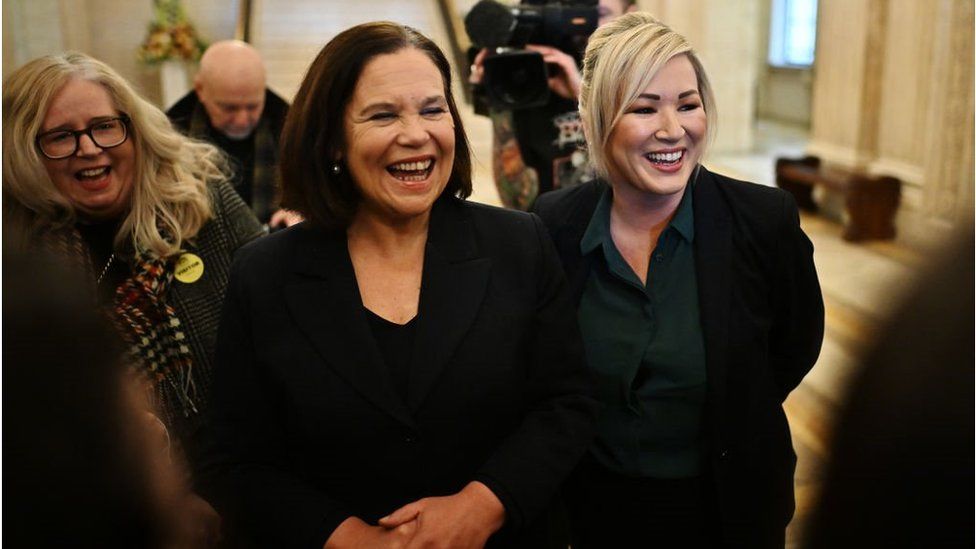DUP deal puts Northern Ireland on brink of landmark moment
- Published

There are two key observations to make right now about what we are seeing in Northern Ireland.
We are hearing reaction to a deal that we haven't actually seen yet.
And we are perhaps just days away from a Sinn Féin First Minister of Northern Ireland - a landmark moment in the history of that part of the UK.
All of this is about the collision of the complex politics of Northern Ireland and the complex politics of Brexit.
Brexit is all about where laws are made and where they are applied.
When those things change, as happened when the UK left the European Union, borders become more important: Borders being lines where one set of laws end and another begin.
Enter next the complex politics and history of Northern Ireland - and so a desire to avoid a hard border on the island of Ireland, between Northern Ireland in the UK and the Republic of Ireland in the EU.
The solution was to check stuff crossing the Irish Sea from Great Britain to Northern Ireland, the so-called border in the Irish Sea, an idea many unionists recoiled from as it suggested, to them, a watering down of Northern Ireland's place in the United Kingdom.
In big picture terms, that is what led to the collapse of devolved government two years ago and the Windsor Framework being signed between the UK and the EU nearly a year ago.
As I wrote at the time, the real prize then was what we are on the brink of now - the restoration of devolution.
The building block for what we will first see published on Wednesday, the so-called Command Paper that will set out what will change, was the Windsor Framework.
The Windsor Framework was the new agreement between the UK and the EU. It was an attempt to assuage the fears of unionists.
It acknowledged those difficulties explicitly on page three: "The government recognises that the unionist community has felt that their aspirations, identity and economic rights…have been undermined."
But, for the best part of a year, it proved to not be enough.
So what do we think has changed?
The former DUP leader Edwin Poots told the World at One on Radio 4 that he had read the Command Paper and goods sold in Great Britain for use in Northern Ireland will face "no checks".
The so-called Green Lane, for such goods, will be to all intents and purposes scrapped, I'm told. Let's see if that is how everyone sees it when it is published.
It would appear there will be political language that verbally paints a union flag on elements that are tweaked, to emphasise the UK single market and Northern Ireland's place within it.
There will also be a so-called East-West Council - something DUP leader Sir Jeffrey Donaldson publicly called for at his party's conference in October.
It would act, its advocates hope, as a binding agent on Northern Ireland's place in the UK, allowing regular discussion to enhance the prospect of collaboration.
Again, let's wait for the detail.
Plus, there is another strand, confirmed today, that Northern Ireland will be able to benefit from free trade agreements the UK signs with other countries.
Prior to this moment there has been a painstaking attempt, in private, to assemble the various moving parts to bring about an agreement.
Agreement between the government and the DUP. Agreement between the EU and the UK. Agreement among Conservatives. Agreement among the DUP. None of these are easy. All of them together, very hard.
Passionate Brexiteers on the Conservative backbenches have been briefed. Sir Jeffrey Donaldson has finally reached the point he believes he can take his party with him. Or at least most of it.
And he's a man who knows all about noisy figures deciding their party is going further than they can stomach. He was once that very person, when, 20 years ago, he left the Ulster Unionist Party.
Little wonder in recent weeks he has been assiduous in trying to ensure the DUP didn't fracture irreparably - in a way that could imperil a deal, and his leadership.
Now, we await the Command Paper. Does it sufficiently match, in its detail, the rhetoric those who have read it attach to it?
On Thursday, MPs are expected to debate the plans in the Commons. In legislative terms, I'm told this can be sorted via two so-called Statutory Instruments - tweaks to existing legislation.
And then, will there be anything to hold up the restoration of devolution as soon as Friday?
And with it, then or soon afterwards, if there isn't a last minute hitch, a Sinn Féin First Minister, Michelle O'Neill.
Northern Ireland, a part of the UK, whose First Minister aspires one day for it to be part of another state, the Republic of Ireland.
What a moment that will be.
- Published30 January
- Published30 January
- Published3 February
- Published2 February